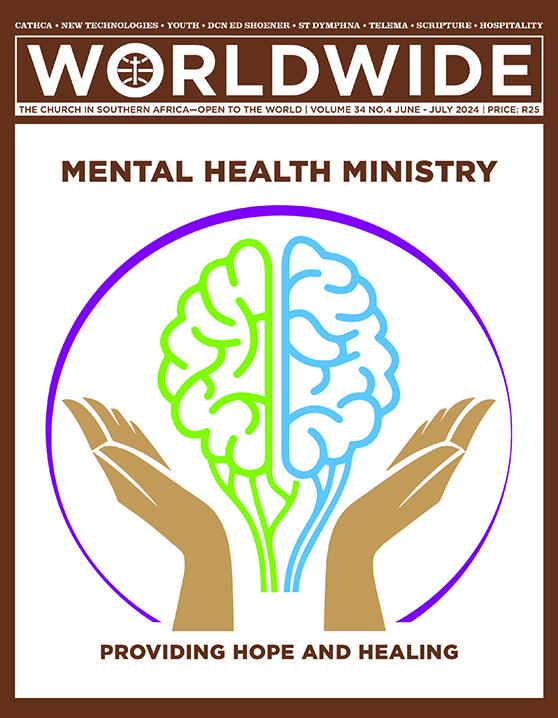
MENTAL HEALTH MINISTRY: PROVIDING HOPE AND HEALING
The colours symbolise peace and nature, the brain represents the mind and the hands imply care—thus giving the impression of ‘the mind in caring hands.’ (Lauren Bikhani, Mental Health Ministry Coordinator at All Saints Catholic Church, Ennerdale, Johannesburg).
Design by Warren Singh from DesignCreed.
FOCUS • CATHCA
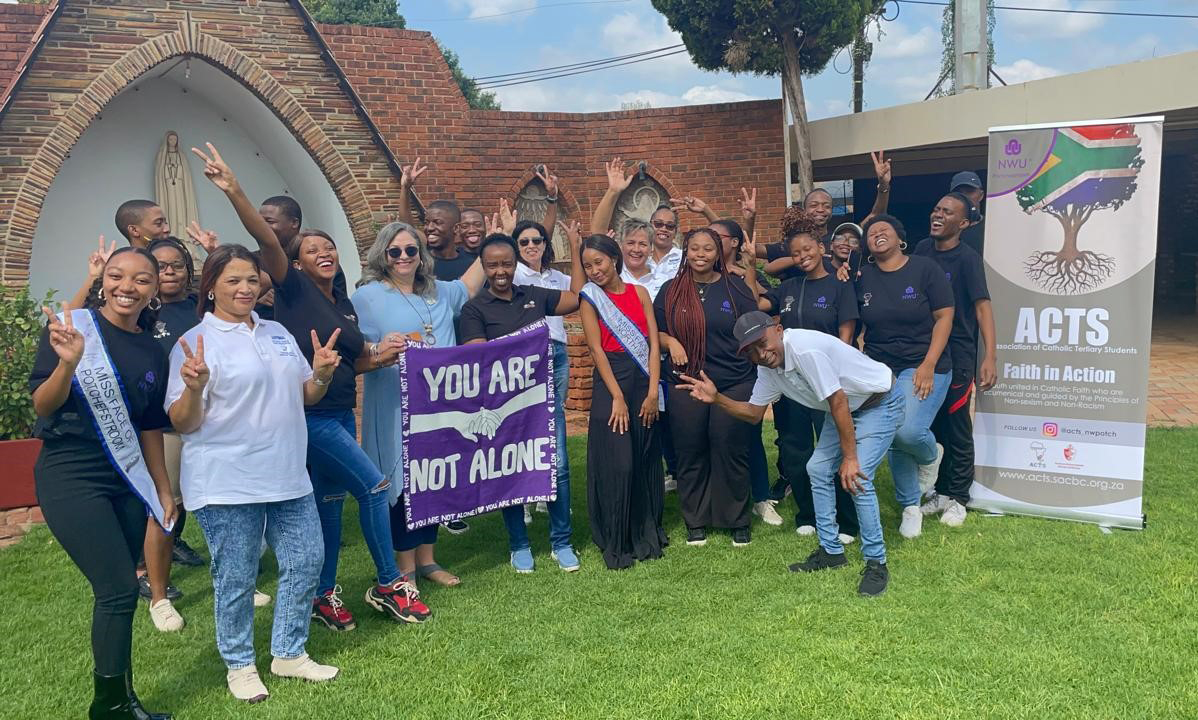
RATIONALE FOR CATHOLIC MENTAL HEALTH MINISTRY
Mental health is a critical component of our wellbeing. Ministering to those who suffer from mental illness is an essential part of the pastoral care of the Church. CATHCA (Catholic Health Care Association of Southern Africa) is trying to address some of the many existing challenges in this field
BY DR MELESE SHULA PhD | MENTAL HEALTH & PSYCHOSOCIAL SUPPORT TRAINING COORDINATOR, CATHCA, JOHANNESBURG
As the voice representing the Catholic Church in Southern Africa, we are deeply concerned with the heartbreaking prevalence of mental illness in our society and are taking action to address this tragic form of misery and sorrow. Mental health challenges affect all aspects of a person’s life—work and rest, family life and relationships, prayer, and even one’s relationship with God.
Silent pandemic
Mental health is a public health problem in South African society today. Statistics released by the South African Depression and Anxiety Group (SADAG) in 2019 indicated that as many as one in six South Africans suffer from anxiety, depression, or problems associated with substance abuse—this does not even include more serious conditions such as bipolar disorder or schizophrenia. In addition, it is believed that over 40% of people living with HIV in South Africa have a diagnosable mental disorder. Sadly, only 27% of South Africans reporting severe mental illness ever receive treatment. This means that nearly three-quarters of these sufferers are not accessing any form of mental healthcare at all (sacap.edu.za). Stigma and discrimination surrounding mental health pose a major stumbling block. The long-term effects of the Covid-19 pandemic have exacerbated mental health conditions, especially among the poor and vulnerable in our society. Socio-economic factors also have a negative impact on mental health.
As many as one in six South Africans suffer from anxiety, depression, or problems associated with substance-abuse.
The South African Government’s mental health policy provides a sound legal framework to uphold the right to mental health care for those in need, but its effective implementation remains a major challenge, especially in underprivileged communities. While specialized psychiatric care is largely available at national referral hospitals, there are limited mental health services provided by lower levels of care such as local clinics and community-driven projects. This negatively impacts the country’s mental health well-being and social inclusion.
We have observed evidence of a high prevalence of mental health conditions in many underprivileged communities where the Catholic Mental Health Ministry is implemented. Experiences of depression, anxiety, chronic stress, and substance abuse are common in the emotional lives of many people in our society. Severe mental illnesses such as schizophrenia and bipolar disorder also affect those who are affected and their families.
Many people with mental health problems do not seek help for their condition due to social stigma.
Unfortunately, mental health ministry has been neglected by pastoral agents—among them clergy and others in positions of influence—due to a lack of understanding of what it constitutes and how to address the stigma and discrimination associated with mental illness. Many people with mental health problems do not seek help for their condition due to social stigma. Mental health experts have warned that the “silent pandemic” of poor mental health is too serious to be ignored, both in terms of every human life that is affected and in terms of the wider impact on society.
Challenges in mental health care ministry
We see challenges in the communities’ experiences from two-pronged aspects in relation to mental health care. Challenges on the demand side include lack of knowledge and positive attitudes towards help-seeking behavior regarding mental health, often fueled by social stigma and the belief that people with mental health conditions are bewitched, possessed, or sinners. Challenges on the supply side include limited access to support groups and mental health services for managing psychological distress, anxiety, depression, suicidal tendencies, substance abuse, and more severe mental health conditions such as schizophrenia and bipolar disorder.
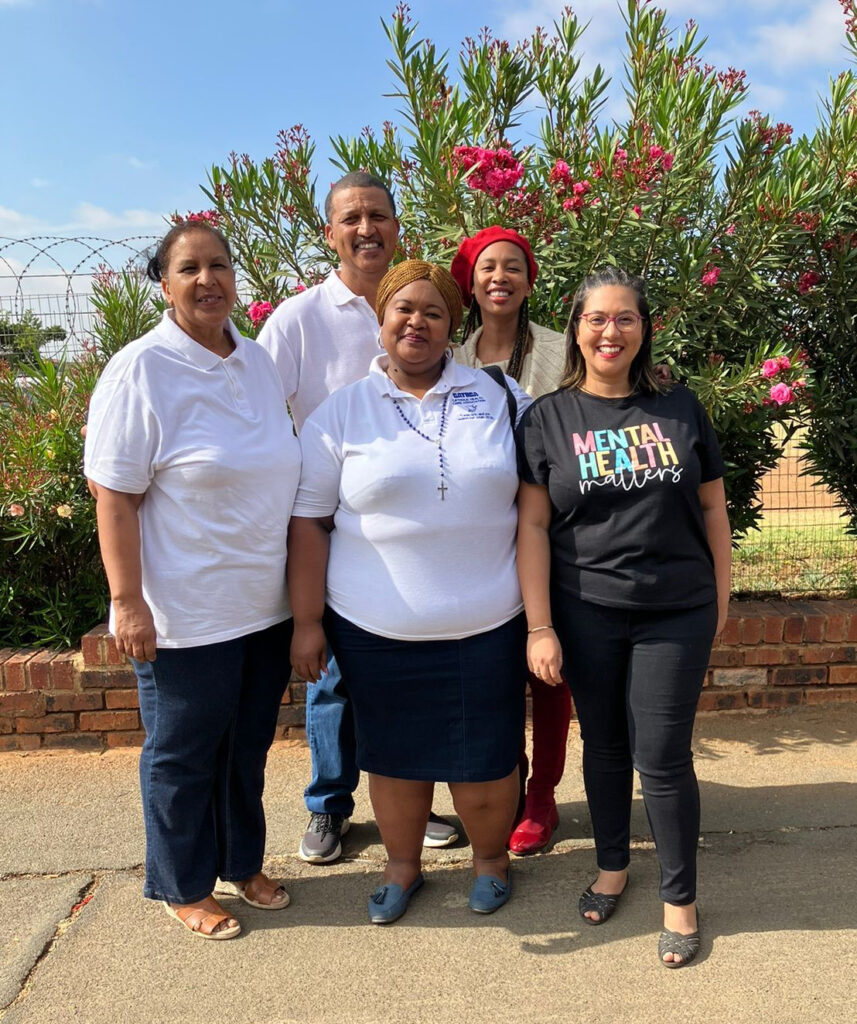
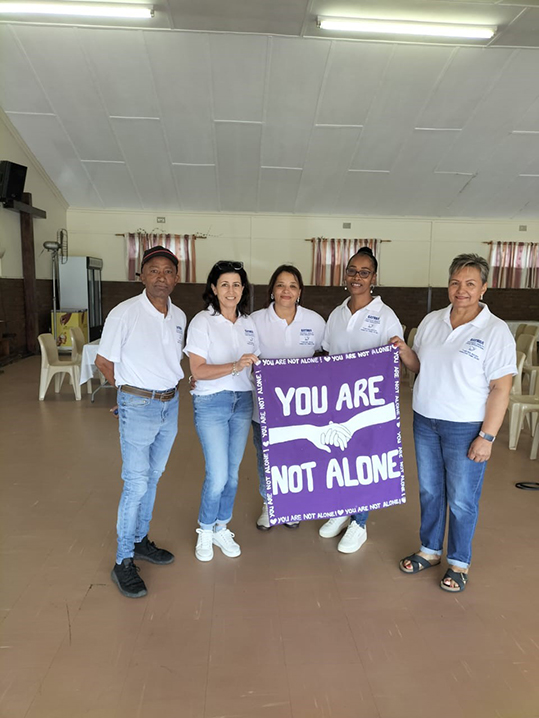
These challenges are exacerbated by limited coordination amongst stakeholders and providers of mental health services at various levels, from community- based outreach programmes to outpatient services and hospitalization. There are many people in parish communities who need psychosocial support, counselling, treatment, and care for mental illness, but who experience difficulties in accessing help and support. Similarly, there are many people in parishes who are eager to take on a ministry role to reach out to their fellow community members who struggle with mental health issues and substance addiction, who hesitate to act because they don’t know exactly what to do. “Whoever suffers from mental illness ‘always’ bears God’s image and likeness in themselves, as does every human being. In addition, they ‘always’ have the inalienable right not only to be considered as an image of God and therefore as a person, but also to be treated as such” (St John Paul II 1996, n.4).
Concrete Interventions
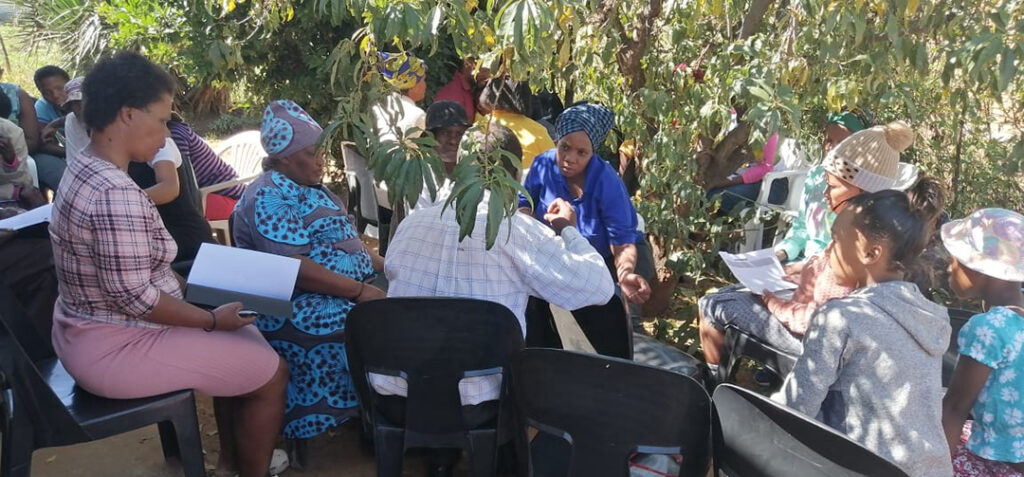
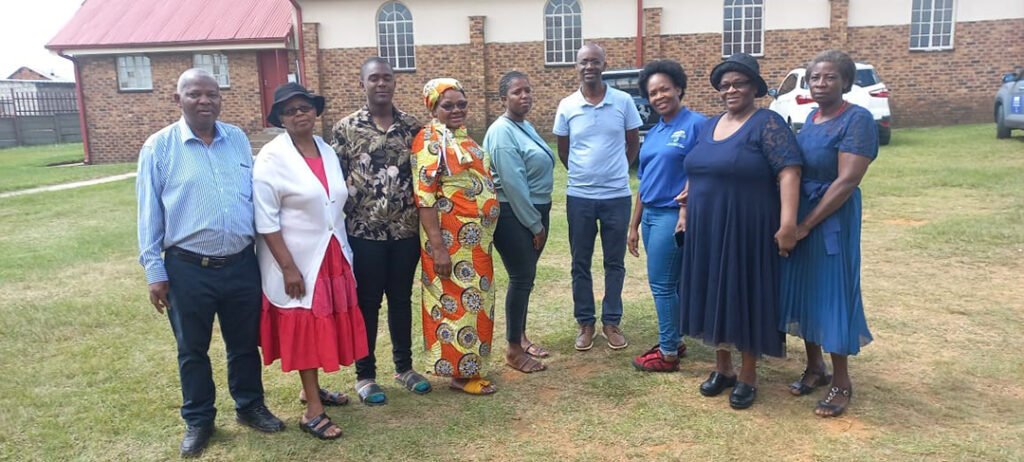
CATHCA is a partner of the Association for Catholic Mental Health Ministers and is committed to supporting parishes and Catholic Mental Health Ministry team of All Saints Catholic Parish in Ennerdale – Johannesburg. Mental Health Ministry team of Potchefstroom Klerksdorp Diocese— ready for an outreach. Many people with mental health problems do not seek help for their condition due to social stigma. 14 WORLDWIDE JUNE-JULY 2024 dioceses in being a healing presence in the lives of people with mental illness. In 2022, CATHCA launched a Catholic Mental Health Ministry in two parishes of the Archdiocese of Johannesburg, namely All Saints and Our Lady of Mercy. In 2023 it relocated to the Diocese of Klerksdorp and in 2024 to the Dioceses of Emalahleni- Witbank and Bethlehem. In these dioceses CATHCA empowered clergy and lay people with down-to-earth training, mentoring, support, and resources to raise awareness about mental health care and to reach out to people with mental challenges.
Mental Health Ministers are parish priests, members of pastoral councils/ sodalities, catechetical coordinators, and parishioners with a desire to reach out to fellow members of the parish and broader community. They are trusted because they live among those they serve. They have a valuable role to play in sensitizing local people about mental health and enabling those with mild-to-moderate mental challenges such as stress, anxiety, depression, and substance abuse to become responsible for their own mental wellbeing; they also refer people with more severe mental conditions like psychosis or bipolar disorder to specialist services.
CATHCA empowered clergy and lay people with down-to-earth training, mentoring, support, and resources to raise awareness about mental health care and to reach out to people with mental challenges.
The beneficiaries consist of members from the local parishes/communities particularly those with mental challenges associated with trauma, mental illness, age, gender, economic conditions, marginalization, isolation, and other environmental or genetic factors. They are mentored to acquire skills, attitudes, and behaviors that help them become responsible for their own mental wellbeing; they receive spiritual and psychosocial support to overcome distress, stigma, and shame and to engage meaningfully in the community; and if and when required, they are referred to specialized services that can address more severe mental disorders along with situations of concern and emergency.
Guiding principles
As the Catholic Mental Health Ministry is implemented, the ministers are called upon to keep in mind the six main principles that guide this valuable ministry:
- The Church, health care professionals, and scientific researchers should work together to improve mental health care. An effective and sustainable response to mental illness in the Church requires a collaborative approach.
- Those in need must be met and attended to where they are.
- Those impacted by suicide need a compassionate response.
- Christ calls the ministers to attend to those who suffer from mental illness and provide hope and healing.
- The scope and burden of mental illness in our society are enormous. Mental health concerns affect all members of society.
- Those suffering from mental illness should not be stigmatized or judged.
CATHCA’s vision and mission

The mission of the Catholic Mental Health Ministry is to reach out to people living with mental health challenges, show them compassion, and empower them to practice self-care and help-seeking behavior which contributes to healing and wellness. Catholic Mental Health Ministry is a response to the call by Pope Francis to “overcome the stigma that brands mental illness and to ensure that the culture of community prevails over the mentality of rejection” (Pope Francis 2021). Catholic Mental Health Ministry is grounded in the practice of companionship which entails welcoming others with respect and dignity (hospitality); setting aside what makes us different from another person (neighboring); being openly present to the other without judgment (listening); acknowledging our limitations on what we can expect to do and what we can expect from others (limits and boundaries); and journeying together with mutuality (accompaniment). Like the Good Samaritan, we do not walk past those living with mental challenges within our parishes, but instead journey with them and help them and their dear ones to find the support and services they need in a spirit of companionship.
An effective and sustainable response to mental illness in the Church requires a collaborative approach.
The activities that guide the effective implementation of the Catholic Mental Health Ministry as integral part of the pastoral mission of the parishes are designed to comprise training workshops and mentoring sessions with a mix of theoretical and practical elements. Furthermore, the training offered to the teams is conducted by CATHCA in partnership with community collaborators and stakeholders with an approach that encourages Catholic parish mental health teams to contribute to their own learning journey.
Networking
Catholic Mental Health Ministry teams are assisted in developing a working relationship with community-based organizations, health professionals, and concerned stakeholders with a view to bringing mental health awareness into parish communities; establishing support groups and outreach programs for people with mental health conditions and their loved ones; and transferring those in situations of concern, emergency, and crisis associated with mental disorders to relevant service providers. CATHCA prides itself on working together with parish priests, pastoral councils, catechetical coordinators, and sodalities in all aspects of mental health ministry from design and implementation to monitoring and adaptive management with a view to creating a sense of ownership and pastoral duty in the parish mental health teams, nurtured by the endorsement of the diocesan leadership. Through this ministry, people with mental challenges associated with trauma, mental illness, aging, socio-economic adversity, marginalization, isolation, and other environmental or genetic factors have been receiving assistance

